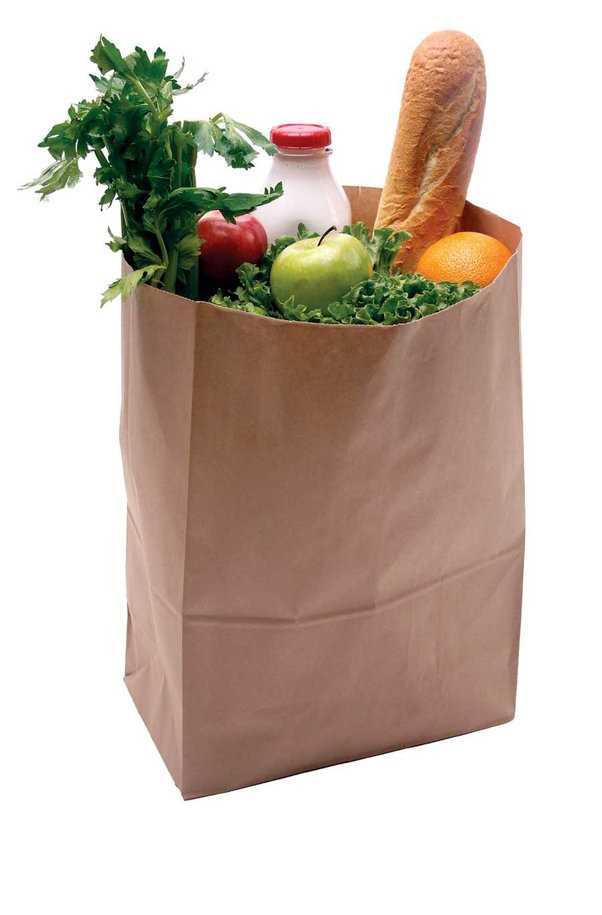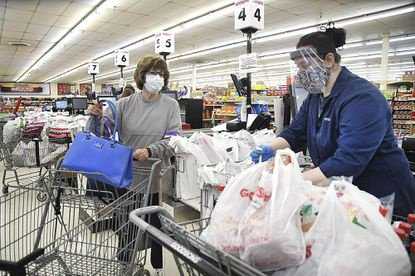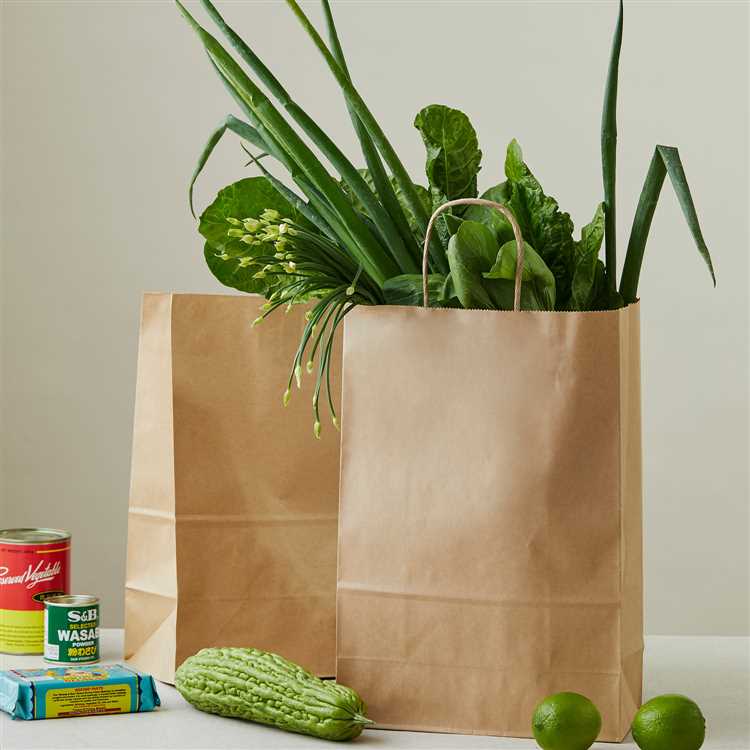
When it comes to grocery shopping, Americans have a wide range of options to choose from. In recent years, there has been a growing concern about the impact of single-use plastic bags on the environment. This has led many consumers to seek out alternative options, such as paper bags.
Paper bags have been around for decades, but they have gained popularity in recent years due to their eco-friendly nature. Unlike plastic bags, which can take hundreds of years to decompose, paper bags are biodegradable and can be recycled. This makes them a more sustainable choice for those looking to reduce their environmental footprint.
In addition to their environmental benefits, paper bags also offer other advantages. They are sturdy and can hold heavy items without tearing, making them suitable for carrying groceries. They are also breathable, which helps to keep produce fresh for longer periods of time. Many people find paper bags more aesthetically pleasing than plastic, which adds to their appeal.
However, despite their advantages, paper bags are not without their drawbacks. They are generally more expensive to produce than plastic bags, which can lead to higher costs for both retailers and consumers. Paper bags are also not as durable as plastic bags and can be more susceptible to moisture and tearing. Some consumers may find that paper bags are not as convenient to use, as they may not fold up as easily or take up as little storage space as plastic bags.
In conclusion, paper bags have become a popular alternative to plastic bags for groceries among Americans. Their eco-friendly nature, durability, and aesthetic appeal make them an attractive choice for those looking to make more sustainable choices. However, the higher cost and potential inconvenience may deter some consumers from using paper bags exclusively. Ultimately, the choice between paper and plastic bags comes down to personal preference and priorities in terms of environmental impact.
- Are Paper Bags Popular for Groceries Among Americans?
- Paper Bags as an Alternative to Plastic
- Strength and durability
- Reusable and recyclable
- Sustainability and Environmental Concerns
- Rise of Reusable Bags
- Consumer Perception and Choice
- Changing Business Practices
- Conclusion
- Government Regulations and Initiatives
- The Future of Paper Bags in the US Market
- Rising Awareness and Shift in Consumer Behavior
- Advantages of Paper Bags
- Q&A:
- Are paper bags commonly used for groceries in America?
- What are the advantages of using paper bags for groceries?
- Do supermarkets in America provide paper bags for customers?
- Are there any disadvantages of using paper bags for groceries?
- What are the alternatives to paper bags for carrying groceries in America?
Are Paper Bags Popular for Groceries Among Americans?

When it comes to grocery shopping in the United States, paper bags have been a popular choice among Americans for many years. While plastic bags were once widely used, there has been a growing concern about their impact on the environment, leading to a shift in preferences towards more eco-friendly alternatives such as paper bags.
One of the reasons why paper bags have gained popularity is their biodegradability. Unlike plastic bags, which can take hundreds of years to decompose, paper bags break down much quicker, reducing their negative impact on the environment. This aligns with the increasing awareness and efforts to reduce plastic waste and promote sustainable practices.
Another factor contributing to the popularity of paper bags among Americans is their versatility. Paper bags can be used not only for carrying groceries but also for various other purposes, such as packing lunches, storing items, or even as gift bags. The sturdiness and durability of paper bags make them a practical choice for everyday use.
In addition, many grocery stores and retail chains have started to offer paper bags as an alternative to plastic bags. Some stores even incentivize customers to use paper bags by providing discounts or rewards for bringing their own reusable bags. This has further contributed to the growing popularity of paper bags among Americans.
However, it is worth noting that while paper bags are a more environmentally-friendly option compared to plastic bags, they still have their own environmental impact. The production of paper bags requires the cutting down of trees and consumes a significant amount of energy and water. Therefore, it is important for consumers to consider the overall lifecycle impact of different types of bags and make informed choices based on their personal values and priorities.
In conclusion, paper bags have become increasingly popular for groceries among Americans due to their biodegradability, versatility, and the efforts of businesses to promote sustainable practices. While they are a step in the right direction towards reducing plastic waste, it is important for consumers to be conscious of the environmental impact of their choices and explore other alternatives, such as reusable bags, whenever possible.
Paper Bags as an Alternative to Plastic
Paper bags are increasingly gaining popularity as an alternative to plastic bags for groceries among Americans. With growing concerns about the environmental impact of plastic bags, many people are turning to paper bags as a more sustainable option.
One of the key advantages of paper bags is their biodegradability. Unlike plastic bags that can take hundreds of years to decompose, paper bags break down naturally and quickly, minimizing their impact on the environment. This makes them a preferred choice for those who are conscious of their carbon footprint.
Strength and durability
Contrary to popular belief, paper bags are relatively strong and durable. They can hold a significant amount of weight without tearing, making them suitable for carrying groceries, including heavy items like bottles and cans. Additionally, paper bags are easier to handle and less prone to accidents such as spills and breakages.
Reusable and recyclable

Paper bags are not only reusable but also recyclable. Many Americans reuse their paper bags for various purposes, such as packing lunches, storing items, or even using them as gift bags. When a paper bag reaches the end of its lifecycle, it can be easily recycled, contributing to the circular economy and reducing waste sent to landfills.
Furthermore, the production of paper bags requires significantly less energy and resources compared to plastic bags. Paper bags are made from a renewable resource – trees, which can be replanted and sustainably managed. This further reduces the environmental impact of paper bag production and makes them a more sustainable choice.
In conclusion, paper bags are becoming increasingly popular among Americans as a sustainable alternative to plastic bags for groceries. They are biodegradable, strong, reusable, and recyclable, making them a more environmentally-friendly option. By choosing paper bags, individuals can make a positive impact on the environment and help reduce plastic waste.
Sustainability and Environmental Concerns
When it comes to choosing a bag for groceries, sustainability and environmental concerns play a significant role in the decision-making process. Paper bags have gained popularity among Americans due to their eco-friendly nature. Unlike plastic bags, paper bags are biodegradable and can be easily recycled.
Concerns over the negative impact of single-use plastic bags on the environment have prompted many Americans to opt for paper bags. The production of paper bags requires less energy compared to plastic bags, and the manufacturing process produces fewer greenhouse gas emissions.
Furthermore, paper bags are made from a renewable resource – trees. Responsible forestry practices ensure that new trees are constantly being planted to replace the ones used for paper production. This emphasis on sustainability makes paper bags an attractive choice for environmentally conscious individuals.
However, it’s worth noting that the production of paper bags still has an environmental footprint. The manufacturing process requires water, energy, and chemicals. Additionally, the transportation of paper bags to stores contributes to carbon emissions.
While paper bags are a more sustainable option compared to plastic bags, reusable bags are considered the most environmentally friendly choice for groceries. By utilizing durable and long-lasting fabric bags, consumers can significantly reduce waste and minimize their carbon footprint.
In conclusion, while paper bags have gained popularity among Americans for their eco-friendly nature and recyclability, reusable bags remain the best option for those who prioritize sustainability and environmental concerns.
Rise of Reusable Bags
In recent years, there has been a significant rise in the popularity of reusable bags as an alternative to traditional paper bags for groceries in America. This shift can be attributed to several factors.
First and foremost, reusable bags are seen as a more environmentally friendly option. With growing concerns about the impact of plastic waste on the planet, many Americans are opting for reusable bags to reduce their contribution to this problem. Reusable bags are often made from durable materials like canvas or recycled plastic, which can be used multiple times before they wear out. This not only reduces the amount of waste generated but also minimizes the need for raw materials and energy required to produce new bags.
Another reason for the rise of reusable bags is the increasing awareness of the harmful effects of single-use paper bags. Paper bags are typically made from trees, which require deforestation and have a significant carbon footprint. Additionally, the production of paper bags involves the use of chemicals and water, further contributing to environmental degradation. Reusable bags, on the other hand, offer a sustainable alternative that reduces the negative impact on the environment.
Besides the environmental benefits, reusable bags also offer practical advantages. Many reusable bags are designed to be sturdy and spacious, allowing them to hold a larger quantity of groceries compared to paper bags. This is especially advantageous for individuals or families who prefer to do their grocery shopping in bulk. Additionally, reusable bags often feature reinforced handles and bottoms, making them more comfortable to carry and less prone to tearing.
Furthermore, reusable bags have become increasingly fashionable. Many retailers offer a wide range of stylish and trendy reusable bags that cater to different tastes and preferences. This has helped to destigmatize the use of reusable bags and encouraged more people to make the switch.
Overall, the rise of reusable bags in America can be attributed to their environmental benefits, practical advantages, and increased fashion appeal. As individuals become more conscious of their impact on the planet, it is likely that the popularity of reusable bags will continue to grow.
Consumer Perception and Choice
When it comes to grocery shopping, Americans have a wide range of choices for carrying their purchases. While plastic bags have been a popular option for many years, there has been a recent shift in consumer perception and choice towards paper bags.
One reason for this change in perception is the growing concern for the environment. Many Americans are becoming more aware of the negative impact that plastic bags can have on the planet. Paper bags, on the other hand, are considered to be more eco-friendly as they are made from renewable resources and are biodegradable.
In addition to environmental concerns, consumers also appreciate the sturdiness and versatility of paper bags. Unlike plastic bags, paper bags are less likely to tear or break, making them a more reliable option for carrying groceries. They can also be easily recycled or reused for other purposes, such as storage or crafts.
Furthermore, some Americans are drawn to the aesthetic appeal of paper bags. With their simple and classic design, paper bags can give a sense of nostalgia and authenticity to the grocery shopping experience. They also provide a blank canvas for retailers to showcase their branding and logo, enhancing the overall shopping experience.
Changing Business Practices
The shift in consumer perception towards paper bags has influenced the business practices of many grocery stores and retailers. In response to customer demand, some stores have started to phase out plastic bags and offer paper bags as the default option. This change not only aligns with consumer preferences but also helps businesses demonstrate their commitment to sustainability.
Conclusion
While plastic bags may still be commonly used for groceries among Americans, the perception and choice of consumers are gradually shifting towards paper bags. The growing concern for the environment, the sturdiness and versatility of paper bags, and the aesthetic appeal they offer have all contributed to this change. As a result, businesses are adjusting their practices to meet the evolving preferences of their customers.
Government Regulations and Initiatives
The use of paper bags for groceries has been influenced by various government regulations and initiatives in the United States. One major regulatory measure is the implementation of plastic bag bans at the state and local levels. These bans aim to reduce plastic waste and encourage the use of more environmentally friendly alternatives, such as paper bags.
Several states, including California, Hawaii, New York, and Oregon, have passed legislation banning or placing restrictions on single-use plastic bags. These regulations often require retailers to charge a fee for plastic bags, while also promoting the use of reusable bags or paper bags as alternatives.
In addition to bag bans, the government has also implemented initiatives to promote the use of paper bags. The Environmental Protection Agency (EPA) has launched campaigns to raise awareness about the environmental impact of plastic bags and educate consumers about the benefits of using paper bags. These initiatives highlight the renewable and recyclable nature of paper bags, as well as their lower carbon footprint compared to plastic bags.
Furthermore, some local governments have implemented recycling programs specifically for paper bags. These programs aim to divert paper bags from landfills and encourage their reuse or recycling instead. Recycling centers and drop-off locations have been established to make it convenient for consumers to recycle their paper bags.
Overall, government regulations and initiatives have played a significant role in promoting the use of paper bags for groceries among Americans. By implementing plastic bag bans, raising awareness about the environmental impact of plastic bags, and encouraging recycling, these measures have contributed to the popularity of paper bags as a more sustainable choice.
The Future of Paper Bags in the US Market
As the demand for sustainable and eco-friendly options increases, paper bags are expected to play a significant role in the future of the US market. With growing concern over plastic waste and its impact on the environment, many Americans are turning to paper bags as a more environmentally friendly alternative for grocery shopping.
Rising Awareness and Shift in Consumer Behavior
One of the main factors contributing to the popularity of paper bags in the US market is the rising awareness among consumers regarding the environmental impact of plastic bags. Many Americans are now actively seeking out alternatives that are biodegradable and recyclable.
This shift in consumer behavior has led to an increased demand for paper bags as a sustainable choice for groceries. Retailers and grocery stores have also started to actively promote the use of paper bags as part of their corporate social responsibility initiatives.
Advantages of Paper Bags
Paper bags offer several advantages over their plastic counterparts. Firstly, they are made from a renewable resource – trees, which can be easily replenished through responsible forestry practices. Unlike plastic bags, which take hundreds of years to decompose, paper bags are biodegradable and can be recycled.
Secondly, paper bags have a higher carrying capacity and are more durable than plastic bags, making them suitable for heavier items. This makes them a more practical option for grocery shopping.
Lastly, paper bags are aesthetically pleasing and can be customized with attractive designs or branding, making them appealing to consumers.
Overall, the future of paper bags in the US market looks promising. With an increasing focus on sustainability and environmental responsibility, more Americans are likely to choose paper bags for their grocery shopping needs. Retailers and grocery stores should continue to promote and encourage the use of paper bags as a sustainable alternative to plastic, helping to reduce the overall environmental impact and create a greener future.
Q&A:
Are paper bags commonly used for groceries in America?
Yes, paper bags are quite popular among Americans for carrying groceries. Many people prefer them over plastic bags because they are more eco-friendly and biodegradable.
What are the advantages of using paper bags for groceries?
There are several advantages of using paper bags for groceries. Firstly, they are more environmentally friendly and can be easily recycled or composted. Secondly, paper bags are sturdier and can hold more weight than plastic bags. Additionally, paper bags are generally considered safer for food items as they do not emit harmful chemicals.
Do supermarkets in America provide paper bags for customers?
Yes, many supermarkets in America provide paper bags as an alternative to plastic bags. Some stores even charge a small fee for plastic bags to promote the use of paper bags and reduce plastic waste.
Are there any disadvantages of using paper bags for groceries?
While paper bags have several advantages, there are also some disadvantages. One of the main drawbacks is that paper bags are not as durable as plastic bags and may tear if they get wet or carry heavy items. Paper bags also take up more space and are bulkier to carry compared to plastic bags. Additionally, the production of paper bags requires more resources and energy compared to plastic bags.
What are the alternatives to paper bags for carrying groceries in America?
Apart from paper bags, Americans also use reusable cloth bags, tote bags, and mesh bags for carrying groceries. These alternatives are more environmentally friendly as they can be used multiple times and reduce the consumption of single-use bags.